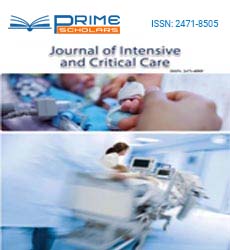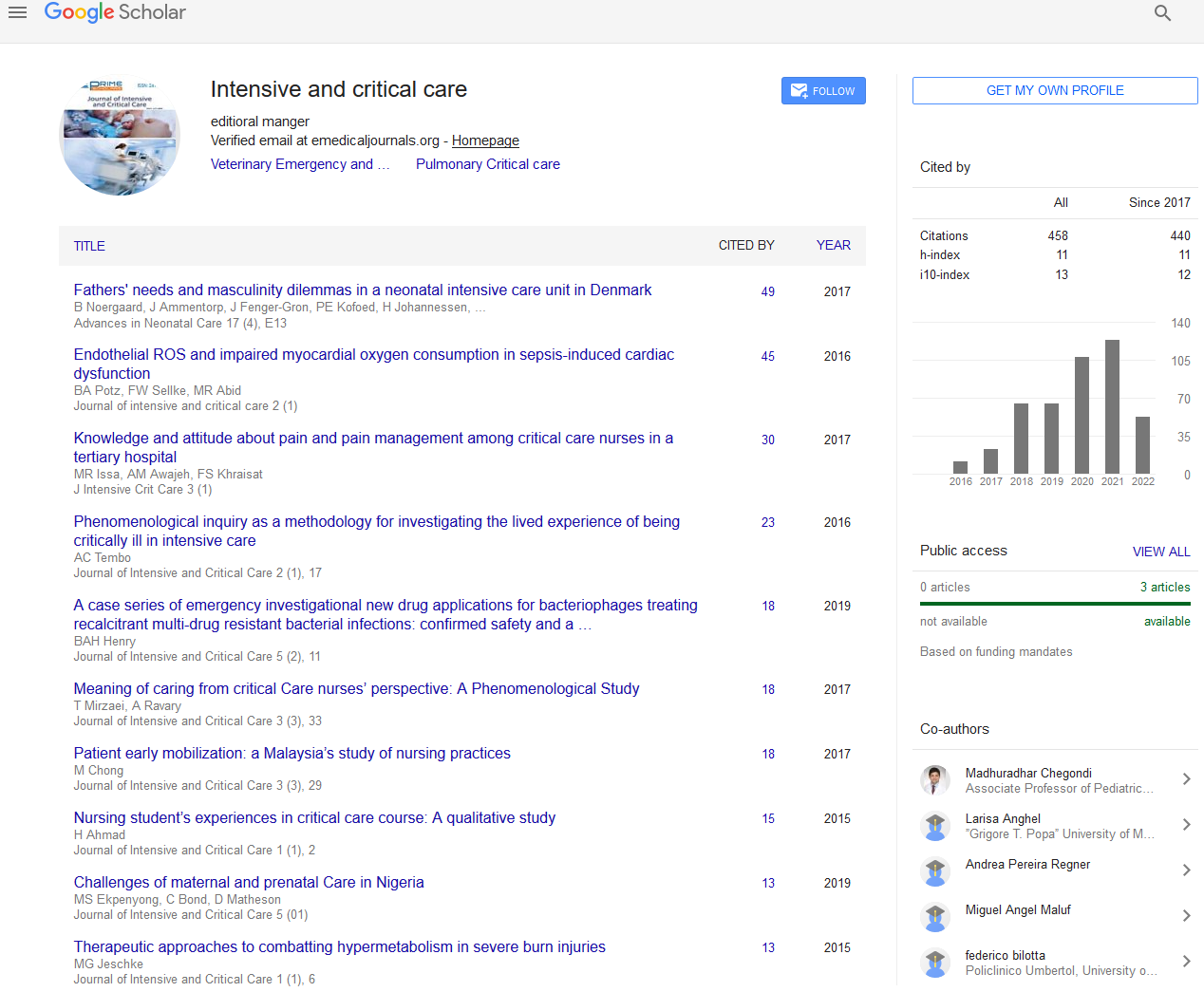Opinion - (2023) Volume 9, Issue 3
Therapeutic Cultivate Care for Children with Unremitting Basic Ailment: Recognizing Qualities and Challenges
Rosechelle M Ruggiero*
Department of Pulmonary and Critical Care Medicine, University of Texas Southwestern Medical Center, USA
*Correspondence:
Rosechelle M Ruggiero,
Department of Pulmonary and Critical Care Medicine, University of Texas Southwestern Medical Center,
USA,
Email:
Received: 31-May-2023, Manuscript No. IPJICC-23-16789;
Editor assigned: 02-Jun-2023, Pre QC No. IPJICC-23-16789 (PQ);
Reviewed: 16-Jun-2023, QC No. IPJICC-23-16789;
Revised: 21-Jun-2023, Manuscript No. IPJICC-23-16789 (R);
Published:
28-Jun-2023, DOI: 10.35248/2471-8505-9.3.28
Introduction
Chronic critical illness is a complex medical condition characterized
by prolonged organ dysfunction, leading to a state of
long-term dependency on life-sustaining therapies. Patients
suffering from chronic critical illness often experience significant
physical, emotional, and financial burdens. However,
recent advancements in medical technology and treatment
strategies have provided renewed hope for improving outcomes
in this challenging population. This article explores the
current understanding of chronic critical illness and highlights
innovative approaches that are transforming the landscape
of its treatment. Chronic critical illness typically arises from a
severe acute illness, such as sepsis, Acute Respiratory Distress
Syndrome (ARDS), or multiple organ failure. Despite initial interventions
and supportive care, some patients do not recover
fully and enter a protracted phase of critical illness. They face
prolonged stays in Intensive Care Units (ICUs) and may require
invasive mechanical ventilation, renal replacement therapy,
or other life-sustaining treatments. In the past, the management
of chronic critical illness focused primarily on providing
supportive care and maintaining organ function. However, this
approach often fell short in improving long-term outcomes
and quality of life. Recognizing the need for alternative strategies,
researchers and healthcare professionals have dedicated
their efforts to developing innovative treatments. New targeted
therapies are emerging as potential game-changers in the
treatment of chronic critical illness. These therapies aim to
address specific underlying mechanisms contributing to organ
dysfunction. For example, immunomodulatory agents target
dysregulated immune responses, reducing inflammation and
improving organ function.
Description
Clinical trials investigating the efficacy of such therapies have
shown promising results, highlighting their potential to transform the management of chronic critical illness. Recognizing
the detrimental effects of prolonged immobilization, early
rehabilitation interventions have gained traction in the ICU
setting. This approach involves initiating physical and occupational
therapy as soon as feasible, even while patients are on
life support. Early rehabilitation helps prevent muscle wasting,
maintain joint mobility, and improve functional outcomes. Additionally,
it contributes to the psychological well-being of patients,
reducing the risk of long-term cognitive and emotional
impairments. Malnutrition is prevalent among patients with
chronic critical illness and contributes to increased morbidity
and mortality rates. Nutritional support plays a crucial role in
promoting recovery and preventing complications. Enteral and
parenteral nutrition strategies have evolved to meet the specific
nutritional requirements of critically ill patients. The use
of specialized formulas, personalized feeding regimens, and
targeted macronutrient compositions has shown promising results
in improving outcomes and reducing infection rates.
Conclusion
The treatment of chronic critical illness has witnessed significant
advancements in recent years. From targeted therapies
to early rehabilitation interventions, nutritional support, telemedicine,
and palliative care integration, these developments
offer hope for improved outcomes and quality of life for patients.
However, it is important to note that chronic critical illness
remains a complex and challenging condition, requiring
further research and ongoing innovation. As healthcare professionals
continue to explore novel treatment approaches,
interdisciplinary collaboration and patient-centred care will be
pivotal in optimizing outcomes for this vulnerable population.
By embracing emerging technologies, tailoring interventions to
individual patient needs, and promoting holistic support, we
can usher in a new era of care for individuals living with chronic
critical illness.
Citation: Ruggiero RM (2023) Therapeutic Cultivate Care for Children with Unremitting Basic Ailment: Recognizing Qualities and Challenges. J Intensive Crit Care. 9:28.
Copyright: © 2023 Ruggiero RM. This is an open-access article distributed under the terms of the Creative Commons Attribution License, which permits unrestricted use, distribution, and reproduction in any medium, provided the original author and source are credited.

